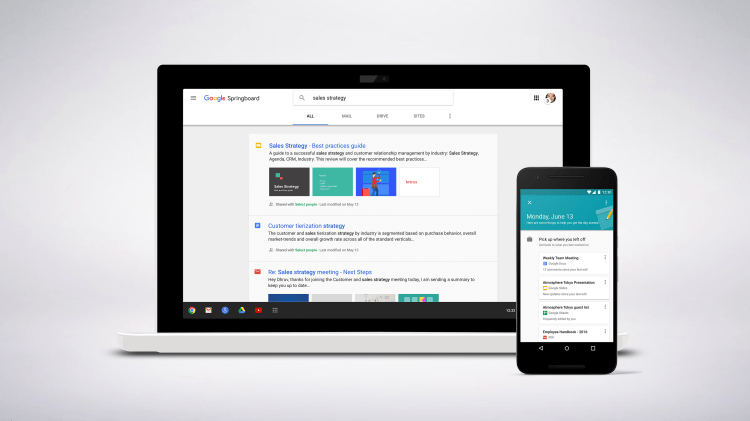At its Atmosphere enterprise-focused event in Tokyo today, Google is showing off a redesign of its Google Sites service for creating and posting sites you share with colleagues, along with a new app called Springboard that proactively shows you files that are relevant to you.
This is the biggest update to Sites since it launched in 2008, following Google’s 2006 acquisition of JotSpot. Google Sites doesn’t get updated quite as frequently as, say, Google Photos or Chrome. But it’s more popular than you might think, with nearly as many active users as Google Drive had back in October 2014 (240 million users).
The new Google Sites has been redesigned to look like a brand new Google service (such as Google Spaces), and it gives users a highly interactive experience for building websites, with support for dragging and dropping elements around each site.

Above: The new Google Sites.
The old version “focused on power users who really understood HTML and JavaScript,” Google director of product management Ryan Tabone told VentureBeat in an interview. But it’s become clear to Tabone and his colleagues that a lot of people just need to distribute content but don’t want to deal with those programming languages.
The app has touches of Microsoft Sway — it resizes images automatically, its results look good across devices, and it’s collaborative, like Google Docs. It draws on Google’s estimable machine intelligence technology to do things like blur parts of the background image underneath header text. And when you want to expand what’s shown in a chart generated inside Google Sheets, you don’t need to tinker with the settings for the chart — you just drag that image bigger with your mouse in Google Sites.
Currently you can’t generate new sites on mobile with the new Google Sites.
Google Springboard
Unlike Google Sites, the Google Springboard app is completely new.
Here’s how Google Apps vice president of engineering Prabhakar Raghavan describes it in a blog post:
Google Springboard helps you find the right information that you need at the moment that you need it. It searches quickly and easily across all of your information in Google Apps, including Gmail, Calendar, Docs, Drive, Contacts and more. Springboard also assists you throughout your workday by proactively providing useful and actionable information and recommendations.
There’s a precedent for this sort of technology — Microsoft’s Office Delve feature, which is part of Office 365. Delve’s whole point is to show you documents that you have access to but might not have known about, even though they’re pertinent to you.
The app will be available for iOS, Android, and the web.
Early access program
In using an early adopter program, Google is taking a new approach to distributing services to users — just like how it began the Android beta program for the Android N preview recently. But early adopter/access programs are common in enterprise software companies — indeed, VMware, the company that Google cloud head Diane Greene cofounded, often uses them.
For Google, the idea is to put software in front of a select group of big companies and get feedback before rolling it out to everyone else. The idea, Tabone said, is to find out if it meets the requirements of big companies and then go about tweaking as needed.
“It’s kind of like a launch and iterate-plus-plus,” he said.
Google Apps for Work admins can apply to become part of the new early adopter program starting today.
Update on June 14: Removed information and a codename for the redesigned version of Google Sites.


